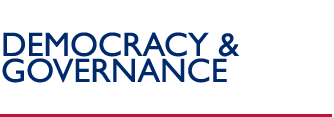Democracy and Governance in Guinea
The Development Challenge: The quality of life for the average Guinean is considered among the lowest in the world. The United Nations Development Program's 2004 Human Development Index places Guinea 160th out of 177 countries listed, a decline of three positions as compared to 2003. Rural inhabitants represent approximately 80% of the population and 60% of the poor. Women are the mainstay of subsistence farming, accounting for 80% of the country's food crop production. Life expectancy is 48.9 years, and only 36% of men and 14% of women are literate. The infant mortality rate is 177 per 1,000 live births, maternal mortality is 528 per 100,000 live births, and HIV prevalence rates are as high as seven percent in urban areas of the Forest Region. However, the country has enormous economic growth potential primarily due to an unusually rich mix of natural resources, including over 25% of the world's known reserves of bauxite, along with diamonds, gold, iron ore, and other metals. Guinea is also endowed with abundant agricultural, forestry, and fishing potential.
Despite being one of Africa's richest countries in natural resources and metals, conditions in Guinea have been steadily declining over the past few years. Estimated 2003 real GDP growth is 1.2%, down from 4.2% in 2002, while the rate of inflation has risen more than 30% since January 2003. Poor governance, weak economic policies and poor infrastructure continue to be major obstacles to attracting much needed foreign investment. Political trends are becoming progressively worrisome as decision-making and authority are becoming increasingly centralized practices of rampant corruption and impunity continue, and political freedoms and human rights are diluted. In the past, the regime of President Lansana Conté provided at least a modicum of economic and political stability. However, this stability is now tentative as political stagnation continues, the economy and quality of life deteriorate, and social discontent rises. In 2004, incidents of rioting occurred in numerous cities throughout the country over poor living conditions, price increases and poor delivery of essential services.
Faced with swelling political and economic difficulties, and also influenced by reductions in donor support, the Government of Guinea (GOG) has recently shown some signs of reform, including adoption of an Emergency Recovery Program in March 2004 along with some relaxation of rules restricting the organization of political opposition meetings and rallies. Bold measures are needed in structural areas such as combating rampant corruption and poor governance, and reforming the public utilities. Fundamental changes are also needed across GOG institutions to diversify the economy, establish a favorable foreign investment climate, and improve and expand the provision of basic social services.
U.S. interests in Guinea remain strong and multi-faceted. Fragile states such as Guinea are becoming increasingly recognized as potential breeding grounds for security threats. Therefore, maintaining stability in Guinea is important to U.S. national security and regional stability. Guinea is bordered by six countries, of which four (Cote d'Ivoire, Sierra Leone, Guinea-Bissau and Liberia) have had serious levels of instability or conflict over the past decade. Throughout this turmoil, Guinea has remained a relatively stable country and has been a receptive host to a significant refugee population. An unstable Guinea could create massive disruption throughout the entire sub-region, impair progress made to date in Liberia and Sierra Leone, and exacerbate the situation in Cote d'Ivoire, requiring significant investments in humanitarian assistance. The U.S. Government (USG) has already invested heavily in bringing peace to both Sierra Leone and Liberia. USAID's continued presence and activities in Guinea will further reinforce U.S. investments in the Mano River Union. In addition, as the Fouta Djallon highlands in Guinea are an important watershed for three major West African rivers that serve over ten countries in the sub-region, instability or civil conflict in Guinea could result in serious environmental damage to the region.
The US maintains close relations with Guinea and operates the 9th largest U.S. Mission in Africa, with representatives from USAID, the Department of State, the Department of Defense, Peace Corps, and the Department of Treasury. Guinea is a moderate Muslim country that maintains a secular orientation in its foreign policy, and has supported U.S. anti-terrorism initiatives through ratification of numerous United Nations conventions on terrorism. The United States also seeks to promote increased U.S. private investment in Guinea's emerging economy. There are several large U.S. corporate operations in Guinea. The principal strategic goals of the U.S. Mission in Guinea are to promote, in priority: regional stability; democracy and human rights; economic prosperity and security; social and environmental issues; and humanitarian response. Within these goal areas, U.S. policy seeks to bolster Guinea's stability, promote sustainable economic and social development, and encourage Guinea to reach international norms of transparency. Progress in the implementation of sound economic, social, political, and environmental policies will enable Guinea to further contribute to regional integration and stability.
The USAID Program: The USAID/Guinea program currently has four strategic objectives. They include: (1) improving natural resources management and incomes in rural areas; (2) improving voluntary family planning and the health and welfare of women and children, and preventing the transmission of HIV/AIDS; (3) providing quality basic education to a larger percentage of Guinean children, with emphasis on girls and rural children; and (4) fostering continued democratic progress by strengthening civil society and promoting good governance. FY 2005 and FY 2006 funds will be used to implement the ongoing efforts under these four objectives. In addition, FY 2006 funds will be used to fund close-out activities under these objectives as a new USAID/Guinea Strategy Statement will be implemented in FY 2007.
(Excerpted from the 2006 Congressional Budget Justification for Guinea)
Back to Top ^
|


